#Sextus Empiricus
Explore tagged Tumblr posts
Text
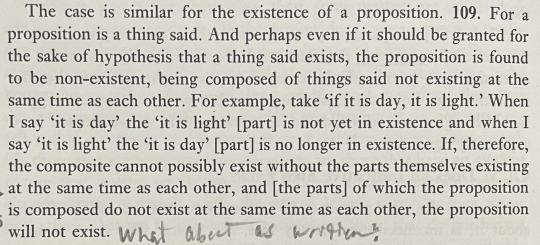
Sextus Empiricus on the "lekton", found in Hellenistic Philosophy: Introductory Readings. I'm reminded of passages from Sokolowski and Rescher that also address the theme of parts and wholes in temporal perspective -
and I find their accounts much more satisfying.
"The fact that the whole is given in a way different from the presence of each placement does not mean that the whole is not given at all; it is just given in a different way."
2 notes
·
View notes
Text
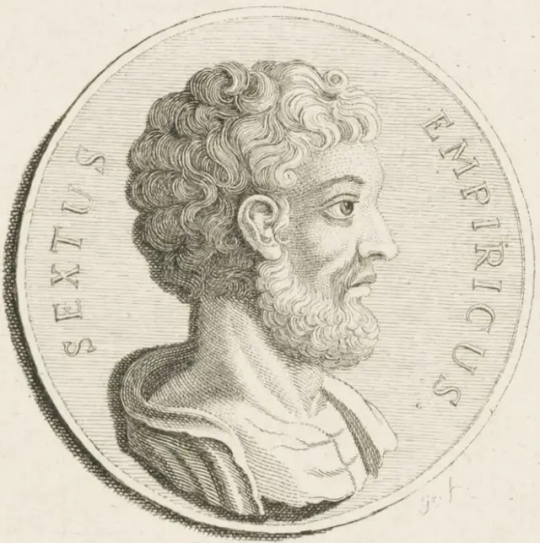
«Así pues, cuando digo “a cada argumento se opone un argumento equivalente” digo implícitamente esto: “Para mí es manifiesto que a cada argumento de los analizados por mí que establece algo dogmáticamente, se opone otro argumento que establece algo dogmáticamente y que es equivalente a él en cuanto a credibilidad o no credibilidad”; de forma que el sentido de esa frase no sea dogmático, sino manifestación de un estado de ánimo humano que para el que lo siente sí es una cosa manifiesta.»
Sexto Empírico: Esbozos pirrónicos, Libro I. Editorial Gredos, pág. 118. Madrid, 1993.
TGO
@bocadosdefilosofia
#sexto empírico#sextus empiricus#esbozos pirrónicos#escepticismo#escepticismo pirroniano#Πυῤῥώνειοι ὑποτύπωσεις#pyrrhōneioi hypotypōseis#razones opuestas#isotenía#suspensión del juicio#epoché#imperturbabilidad#ataraxía#dogmatismo#antidgmatismo#ánimo#ánimo humano#conocimiento#teoría del conocimiento#filosofía griega#época antigua#filosofía helenística#teo gómez otero
2 notes
·
View notes
Text
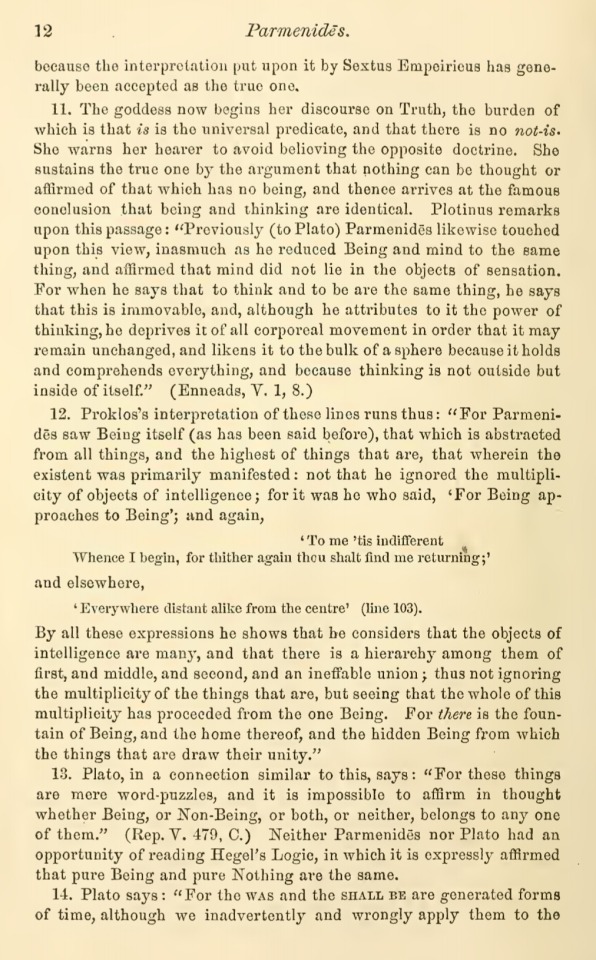
One of my favourite page !! 🤍
0 notes
Text
NC - Sextus Empiricus, Esquisses pyrrhoniennes - Apparences, Isosthénie, Indifférence, Épochè, Ataraxie, Vérité
Notes contemplatives - Sextus Empiricus, Esquisses pyrrhoniennes #Philosophie #MardiCestPhilosophie #Contemplation #SextusEmpiricus #Pyrrhon #Sceptiques #Scepticisme #Apparences #Vérité #Isosthénie #Indifférence #Ataraxie #Épochè
Notes contemplatives de lecture – Note contemplative n° 65 Aucune explication verbale ne remplace jamais la contemplation. Saint-Exupéry, Pilote de guerre. Notes de lecture Apparences Le scepticisme est la faculté de mettre face à face les choses qui apparaissent aussi bien que celles qui sont pensées, de quelque manière que ce soit, capacité par laquelle, du fait de la force égale qu’il y a…
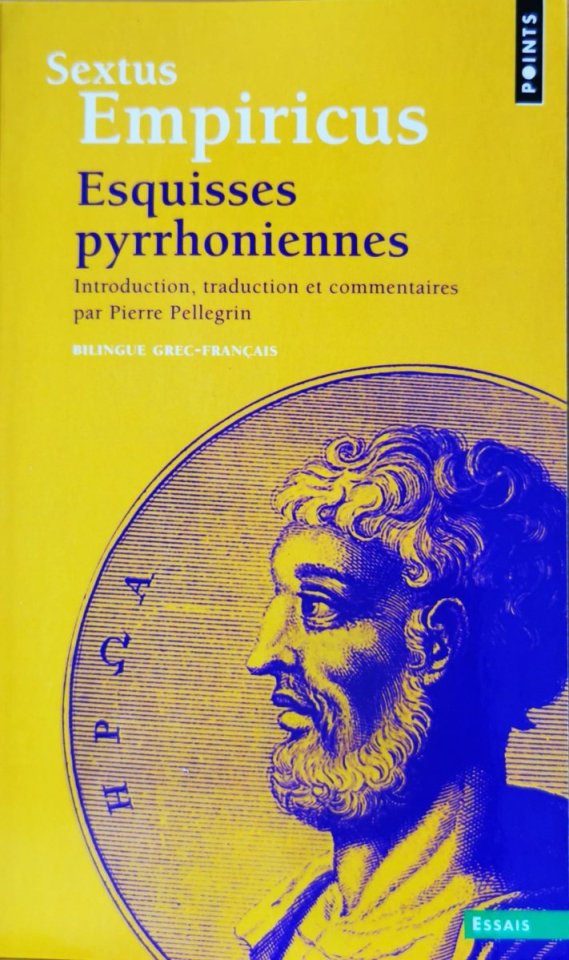
View On WordPress
#MardiCestPhilosophie#Adiaphorie#Apparence#Ataraxie#Égale#Épochè#Contemplation#Force#Indifférence#Isosthénie#Jugement#Mardi c’est philosophie#Notes contemplatives#Philosophie#Pyrrhon#Scepticisme#Sceptiques#Sextus Empiricus#Suspension#Tranquillité#Vérité
0 notes
Text
Becoming Sceptical in a Democracy is Not All That Bad
Trust, some people claim, is the hallmark of a well-functioning democracy. An extension to this argument is that the erosion of trust in democratic structures could cause the decadence of democracy. Oftentimes, political trust has caused belief in democracy and is a consequence of democracy. Citizens cooperate with a trustworthy government and respond to its policies. Conversely, in dysfunctional…

View On WordPress
#goodness of scepticism#GOVERNMENT WORK IS GOD’S WORK#history of scepticism#history of skeptical philosophy#How to Keep an Open Mind#India#sceptical#sceptical about government#sceptical nature of humans#scepticism#scepticism and democracy#scepticism is goof#Sextus Empiricus#skepticism#what is scepticism#what is skepticism
0 notes
Text
νόμῳ γλυκύ, νόμῳ πικρόν, νόμῳ θερμόν, νόμῳ ψυχρόν, ἐτεῇ δὲ ἄτομα καὶ κενόν.
"By convention sweet, by convention bitter, by convention hot, by convention cold, but in reality, atoms and void."
--Democritus of Abdera, fr. 549 KRS (apud Sextus Empiricus, Adv. math. VII.135)
#quote#quotes#quotation#classics#tagamemnon#ancient philosophy#Presocratics#Democritus#atomism#Greek#Ancient Greek
33 notes
·
View notes
Text
So skeptics from antiquity believed that anyone who uses skepticism must sooner or later come to ἀταραξία (absense of disturbances)*
SO. Imagine post-ending Skeptic. In his abstaining from judgment era. No worries era. I care a normal amount (zero) era. And like. He would speak in this funny manner of antique skeptics to say anything with as little attachment as possible. Like "possibly I might suspend denial or vice versa" while he drinks cocktail from a straw. He changed his fancy dramatic detective coat to a bathrobe or something. Got a panama hat hell knows where. "You're not Pyrrho, you're depressed" haters (Paranoid) say. He slowly takes off his sunglasses, revealing huge bags under his eyes, and smirks with "....I apprehend both" and turns on the smiths or smth
But I don't think he could maintain it for long honestly. Some suspiciously good day happens and he's like wait wait wait. need to investigate real quick. and. he tears apart his hawaii outfit and there's perfectly put together detective look underneath. somehow.
*Sextus Empiricus in Outlines of Pyrrhonism "We assert still that the Sceptic's End is quietude in respect of matters of opinion and moderate feeling in respect of things unavoidable. For the skeptic, having set out to philosophize with the object of passing judgment on the sense impressions and ascertaining which of them are true and which false, so as to attain quietude thereby, found himself involved in contradictions of equal weight, and being unable to decide between them suspended judgment; and as he was thus in suspense there followed, as it happened, the state of quietude in respect of matters of opinion"
(felt too fancy to note him in the funny post but not trustworthy to not tell where I'm coming from lol)
39 notes
·
View notes
Photo

Sextus Empiricus
Sextus Empiricus (l. c. 160 to c. 210 CE) was a Greek Skeptic who developed the ideas of the earlier Greek Skeptic philosopher Pyrrho of Elis (l. c. 360 to c. 270 BCE) who claimed that tranquility of mind was attainable by suspending judgment. Empiricus drew on this claim to detail in writing how to implement it fully in one's life.
Nothing is known of Empiricus outside of his works, which give little biographical information. His dates are still debated, and his name is more of a title meaning "Sextus of the Empirical School" referencing his association with the empirical school of medicine (although he seems to have aligned himself more closely with another, the methodist school). According to scholar Thomas Mautner, "his name indicates that he was a physician who based his practice on clinical observation rather than received medical doctrine" (520). This would seem to be so as his works consistently emphasize the importance of personal observation and reflection. He is said to have written ten books on Pyrrhonism of which two survive – Outlines of Pyrrhonism and Against the Mathematicians (commonly given as Against the Professors) – both influential in the modern era.
Empiricus' works were discovered by agents of the Florentine banker and statesman Lorenzo de' Medici (l. 1449-1492) and added to the collection of his library. Translated into Latin in the 16th century, Empiricus' works influenced the French Renaissance philosopher and writer Michel de Montaigne (l. 1533-1592), the French Jesuit apologist and controversialist François Véron (l. c. 1575-1649), and the French writer François de la Mothe le Vayer (l. 1588-1672). Empiricus was then used during the Catholic Counter-Reformation (1545 to c. 1700) to deflate the arguments of the Protestant Reformation (1517-1648).
Empiricus' works continue to be studied in the present day and exert the same power in claiming one cannot come to conclusions on anything because one's interpretation of reality does not correspond to actual reality. According to Empiricus, to live a peaceful life without conflict, one should suspend judgment and even the expectation that one can make sound judgments, but this central point has been ignored more often than not as his works are instead used to attack other ideologies or defend one's own.
Pyrrho & Pyrrhonism
The story of Pyrrho of Elis is largely given by the historian Diogenes Laertius (l. c. 180-240), who is considered unreliable as he never cited his sources and seems to have frequently made stories up. Even so, as some of his observations have been corroborated, he is still used by historians and scholars when no other source is available. According to Laertius, Pyrrho was influenced by the teachings of the atomist Democritus (l. c. 460 to c. 370 BCE) who advocated for a naturalistic, rather than theistic, understanding of the world. Pyrrho was introduced to Democritus' works by his teacher Anaxarchus (l. c. 380 to c. 320 BCE) who was a friend of Alexander the Great (l. 356-323 BCE). Pyrrho and Anaxarchus followed Alexander on his campaign to conquer Persia in 334 BCE, traveling with him to India.
In India, Pyrrho is said to have met with "magi" who, according to Laertius, led him to "adopt a most noble philosophy…taking the form of agnosticism and suspension of judgement" (11.61). Although never identified in Laertius' work, these "magi" were most likely adherents of the philosophical school of Charvaka, which claimed pleasure was the highest good in life and focused on a materialist understanding of the world. Skepticism was an integral aspect of Charvaka in that adherents maintained that any claims one made about anything were based on subjective interpretation of reality, which could not correspond to objective reality simply because one's past experiences and beliefs informed one's interpretation.
As this understanding is quite close to Pyrrho's later philosophy, Charvaka is the most likely influence, although later historians have cited adherents of Hinduism, Jainism, and Buddhism as possible candidates for Laertius' "magi". After returning home to Elis, Pyrrho gave away his possessions and lived a life of simplicity while teaching the philosophical outlook that came to be known as Pyrrhonism.
His teachings were preserved by his student Timon of Philus (l. c. 320 to c. 235 BCE), whose works are now lost but were quoted, in part, by later writers. Among these was Aristocles of Messene (l. c. 1st century) quoted by Eusebius of Caesarea (l. c. 260 to 399 CE) who preserved the so-called Aristocles Passage summing up the precepts of Pyrrhonism. The passage asks three questions:
What is the nature of any subject matter, including ethics?
How should one respond to any subject matter, including ethics?
What will be the outcome of one's response to any subject matter?
The answers are then given:
All observable phenomena are undifferentiated, unstable, and unfixed by their nature.
One's sense perceptions cannot tell one the truth about observable phenomena nor can they lie because observable phenomena are beyond the ability of the senses to truly comprehend.
One should, therefore, refrain from judgments or any conclusions regarding what is perceived, refusing to accept any claims, on the basis that they are neither truth nor a lie but simply a person's observation based on experience and belief.
By suspending judgment and refusing to become involved in a speculative argument over conclusions that are only opinion, one achieves the state of ataraxia, freedom from psychological distress, and maintains one's balance and tranquility in life.
Continue reading...
30 notes
·
View notes
Text
17th century European philosophers when the work of Sextus Empiricus was republished
6 notes
·
View notes
Text

„Von der Natur aus gibt es weder Gutes noch Böses. Diesen Unterschied hat die menschliche Meinung gemacht.“ Sextus Empiricus
Einen schönen Samstag wünsche ich, euch.
7 notes
·
View notes
Text
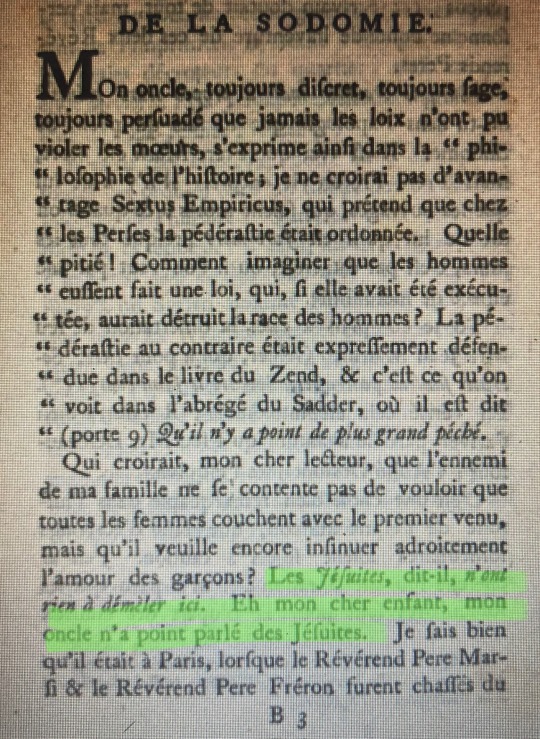
'haha I never actually mentioned the jesuits, YOU just made the connection between them and sodomy'
girlie yes u did mention them in literally The next paragraph 🤓☝️
"Sextus Empiricus et d'autres ont beau dire que ce vice était recommandé par les lois de la Perse ... Mais moi je vous montrerai l'ancienne loi des Persans, rédigée dans le Sadder. Il est dit, à l'article ou porte 9, qu'il n'y a point de plus grand péché ... Si [Sextus Empiricus] eût vécu de nos jours, et qu'il eût vu deux ou trois jeunes jésuites abuser de quelques écoliers, aurait-il eu droit de dire que ce jeu leur est permis par les constitutions d'Ignace de Loyola?"
#<- guy who has read the amour socratique article a normal amount of times.#the screenshot is from la défense de mon oncle; aka V defending his writings against some guy by pretending to be his own uncle(?)#and V quotes the dictionnaire philosophique and says the guy took offense at the sodomy part on behalf of the jesuits.#presumably because V directly gave the jesuits as an example djgkskgksg#voltaire#also the “eh mon cher enfant”. okay bitch.
4 notes
·
View notes
Text
The basic pattern of a statistical analysis is thus familiar from inductive inference: we input the data obtained thus far, and the statistical procedure outputs a verdict or evaluation that transcends the data, i.e, a statement that is not entailed by the data alone. If the data are indeed considered to be the only input, and if the statistical procedure is understood as an inference, then statistics is concerned with ampliative inference: roughly speaking, we get out more than we have put in. And since the ampliative inferences of statistics pertain to future or general states of affairs, they are inductive. However, the association of statistics with ampliative and inductive inference is contested, both because statistics is considered to be non-inferential by some (see Section 3) and non-ampliative by others (see Section 4). Despite such disagreements, it is insightful to view statistics as a response to the problem of induction (cf. Howson 2000 and the entry on the problem of induction). This problem, first discussed by Hume in his Treatise of Human Nature (Book I, part 3, section 6) but prefigured already by ancient sceptics like Sextus Empiricus (see the entry on ancient skepticism), is that there is no proper justification for inferences that run from given experience to expectations about the future. Transposed to the context of statistics, it reads that there is no proper justification for procedures that take data as input and that return a verdict, an evaluation, or some other piece of advice that pertains to the future, or to general states of affairs. Arguably, much of the philosophy of statistics is about coping with this challenge, by providing a foundation of the procedures that statistics offers, or else by reinterpreting what statistics delivers so as to evade the challenge.
Jan-Willem Romeijn, SEP article "Philosophy of Statistics"
3 notes
·
View notes
Text
bro thinks hes diogenes but hes barely even sextus empiricus

This is fucking hysterical
28K notes
·
View notes
Text
Stoic Logic
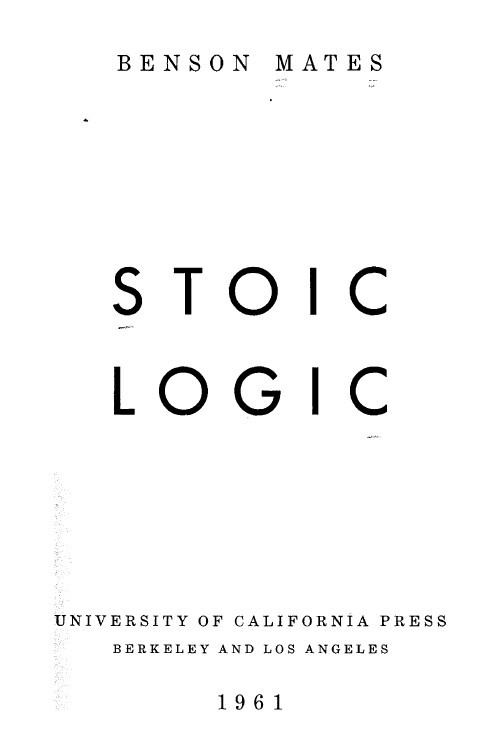
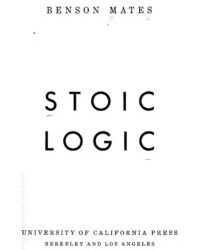
Stoic Logic Stoic Logic by Benson Mates is a landmark study of the propositional logic developed by the early Stoic philosophers, including Zeno, Chrysippus, and their Megarian predecessors. Originally published in 1953 and reissued in 1961, the book presents a rigorous reconstruction of the Stoic logical system, its underlying semantic theory, and its historical sources. Mates draws upon ancient sources such as Sextus Empiricus, Diogenes Laertius, and Galen, and compares Stoic concepts with modern developments in formal logic, including those by Frege and Carnap. The book provides detailed analysis of the Stoics' unique theory of Lekta (sayables), their classification of arguments, and their views on necessity, implication, and propositional structure. This scholarly work remains an essential reference for anyone interested in the history of logic and Hellenistic philosophy. This book is important because it uncovers a largely overlooked chapter in the history of logic. Long before modern symbolic logic, the Stoics developed a propositional system with striking parallels to 20th-century logic. Benson Mates brings these ancient insights to light with scholarly precision, bridging classical philosophy and contemporary thought. Download the book here:

Stoic Logic
Read the full article
#Ancientlogic#Ancienttexts#BensonMates#Chrysippus#Classicallogic#DiodorusCronus#downloadPDF#Formallogic#Freephilosophybooks#Greekphilosophy#Hellenisticphilosophy#Historyoflogic#Lekta#Logic#Megarianschool#Propositionallogic#SextusEmpiricus#Stoicphilosophy#stoicism#UniversityofCaliforniaPress#ZenoofCitium
1 note
·
View note
Text
#Actualizate
☕ Café Filosófico N° 1144 / Filosofía Antigua Romana, presenta:
🎤 “¿PODEMOS ESTAR SEGUROS DE ALGO? SEXTUS EMPIRICUS [160-210 n. e.]”🧐🤔
© Organiza: Buho Filosofico 🦉

📌 CONVERSATORIO:
📆 Sábado 15 de Marzo
🕗 7:45pm.
🏠Centro Cultural Búho Rojo (calle Benjamín Ugarteche 181, altura cruce av. Sucre y av. La Mar – Pueblo Libre)
🚶♀️🚶♂️ Ingreso libre y café de cortesía.
0 notes
Text
It's actually ironic how far away Skeptic is from the skepticism of Hellenistic period (aka the canonical one)
He fully applies to the first part of definition given by Sextus Empiricus: "Scepticism is an ability, or mental attitude, which opposes appearances to judgements in any way whatsoever..." - and he too distinguishes the appearance of real perceived objects, that shouldn't be denied, and the subjective judgement about it, which should. As his character is built after a betrayal of subjectivity (distrust to the narrator and the princess), he clings to the objectiveness as something understandable enough to rely on. Oh and also σκέψις can be translated as examination so it's a funny little throwback to being-locked-in-chains situation
BUT he completely misses out the second, perhaps the most important part: "...with the result that, owing to the equipollence of the objects and reasons thus opposed, we are brought firstly to a state of mental suspense and next to a state of 'unperturbedness' or quietude"
The antic skepticism is about finding serenity in detachment after seeing the ungraspable multiplicity of truth. As opposed, our Skeptic tries to find ease in a single understandable system....which doesn't exist. So he constantly stuck in attempts to solve the unsolvable rather than accept things how they are.
If we're being honest, Cage is more canonically skeptic than Skeptic.
The closest he was to this ideal is MOC. But y'know, he wasn't quite at peace there. Which says a lot.
(Oh and there's the story of how Pirrho saw his teacher drowning in a swamp and walked by without helping, feeling nothing because of how cool his skepticism was - remember the grey and the den, huh?)
Saw a beautiful take somewhere here about how every voice is built with a little unfinished piece. When Opportunist will end up at the top, what's then? When Stubborn's toughest fight will end, what's then? All their worldviews are driven by some inner need, but it often looks like they never could satisfy it, or if they did, their existence would become meaningless. And maybe it's what it is for Skeptic. When he reaches the truth in all its greatness, will he be able to let go? Can he stop constantly craving for a deeper meaning? Will he understand that everything at once in its summation is the truth, controversial as it is? Can he believe?
#voice of the skeptic#stp skeptic#slay the princess#stp analysis#stp meta#I'm embarrassed. I didn't want to write an essay about why single-root words are similar#But then I was like. lol isn't it funny how cage is better at his business. gotta write it down#and the next appeared by itself really. because. i like to overexplain jokes.#btw I think Pyrrho and Arkesilaus are a lot like paranoid and skeptic but#I can't write another paragraph explaining the parallel only I would find funny#and I mean.yeah there are things like scientific skepticism and modern age skepticism that Skeptic applies more to. but I dont like them ok#quoqueanalysis
28 notes
·
View notes